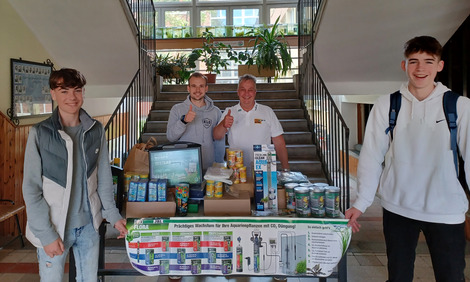As already reported in the last blog post Support for a special school project in Hungary , JBL is supporting the conservation breeding programme for goodeids at Kossuth Lajos Grammar School (KLG) in Mosonmagyaróvár, Hungary. Márk Liziczai, head of this great project, has provided us with further exciting details, and we just have to share them with you.
2013 saw the start of the KLG Goodeid Project at Kossuth Lajos Grammar School in Mosonmagyaróvár. Liziczai Márk, then a student at the school, came up with the idea of founding the project. He has been leading it as a teacher at the institution ever since.
The aim of the project is none other than the protection and conservation of the highly endangered goodeids, which are on the brink of extinction. Kossuth Lajos Grammar School was the first public educational institution in the world to start a conservation programme for these extremely rare fish. Shortly after its foundation, we became a member of the international Goodeid Working Group (GWG), which previously only included zoos and a university in Mexico. In 2018, I was honoured to be appointed Hungarian coordinator of the GWG. The project is now in its ninth school year. The main goal of the programme is to preserve endangered species under artificial conditions. The juvenile fish hatched in the school's laboratory are made available free of charge to interested breeders to ensure a stable European background population.
We are currently keeping and breeding 21 different fish species in varying degrees of threat. The project mainly focuses on the conservation of the goodeids, but also actively participates in the conservation of rare green swordtail fish, which also belong to the livebearing toothcarps. We are currently breeding the swordtail platyfish (Xiphophorus xiphidium), for which I am the European species coordinator, and the extinct Monterrey platy as well. We have several iconic Goodeidae species, such as the Tequila splitfin, which is the first fish species to have once been extinct in the wild but now successfully reintroduced, or the rare strain of Neotoca bilineata or Characodon audax, which is on the verge of extinction. But I am most proud of the two Allotoca species we keep. The Allotoca maculata is highly endangered and is cared for outside our institution by only one or two breeders in the whole of Europe. The Allotoca goslinei is already completely extinct in the wild and only exists in aquariums, so it is an immense responsibility to work with them. My greatest pride, however, is the Allodontichthys polylepis. We have recently been enriched by 10 specimens of what was once considered one of the rarest fish species in the world, which is a tremendous honour.
The project has a double objective. The main goal is, of course, nature conservation work to secure the future of the species. However, the other goal is no less important: to sensitise the KLG pupils to environmental awareness, nature conservation and sustainability. There is no other school in the world where the pupils can work with extinct animals from the wild, because at the school in Mosonmagyaróvár (with teacher support) it is up to the pupils to take care of the fish. For many pupils it was almost a cathartic experience to realise that they can work with much rarer animals, such as the iconic giant panda. This, of course, also increases their sense of responsibility and teaches them to be responsible animal keepers. But what is even more important is the positive orientation of their ecological awareness and their efforts to develop an environmentally conscious mindset. The project is also a very important part of the Eco-Schools programme.
The importance of their protection lies in the fact that the goodeids are originally native to Mexico, where conservation is still in its infancy. Within a few decades, immensely polluted waters, water abstraction, increasing climate change and the introduction of invasive predators have brought these species to the brink of extinction. Apart from their role in the ecological system, they are a very special group of species, as they have what you could see as the second most evolved reproductive strategy after mammals. This is because female toothcarps - unlike other viviparous fish species - are able to nourish their offspring during their embryonic development by means of a placenta-like organ and an umbilical cord (trophotaenia). It is, however, important to know that the fish bred in the Kossuth school will never return to the wild, but will provide a secure base and a guaranteed future for their species. Fortunately more and more serious research and local conservation initiatives have started in Mexico within the last few years, so all is not lost. There is still hope that these species will eventually be able to recolonise their former habitat.
The KLG Goodeid Project focuses on the following fish species:
- Allodontichthys polylepis
- Allotoca goslinei
- Allotoca maculata
- Allotoca zacapuensis
- Ameca splendens
- Ataeniobius toweri
- Chapalichthys pardalis
- Characodon audax
- Goodea atripinnis
- Ilyodon furcidens
- Neotoca bilineata
- Xenoophorus captivus
- Xenotoca doadrioi
- Xenotoca eiseni
- Xenotoca lyonsi
- Xenotoca cf. melanosoma
- Zoogoneticus purhepechus
- Zoogoneticus tequila
- Xiphophorus xiphidium
- Xiphophorus sp. Regio
- Xiphophorus couchianus
Find out more about the school and the project at the following links:
